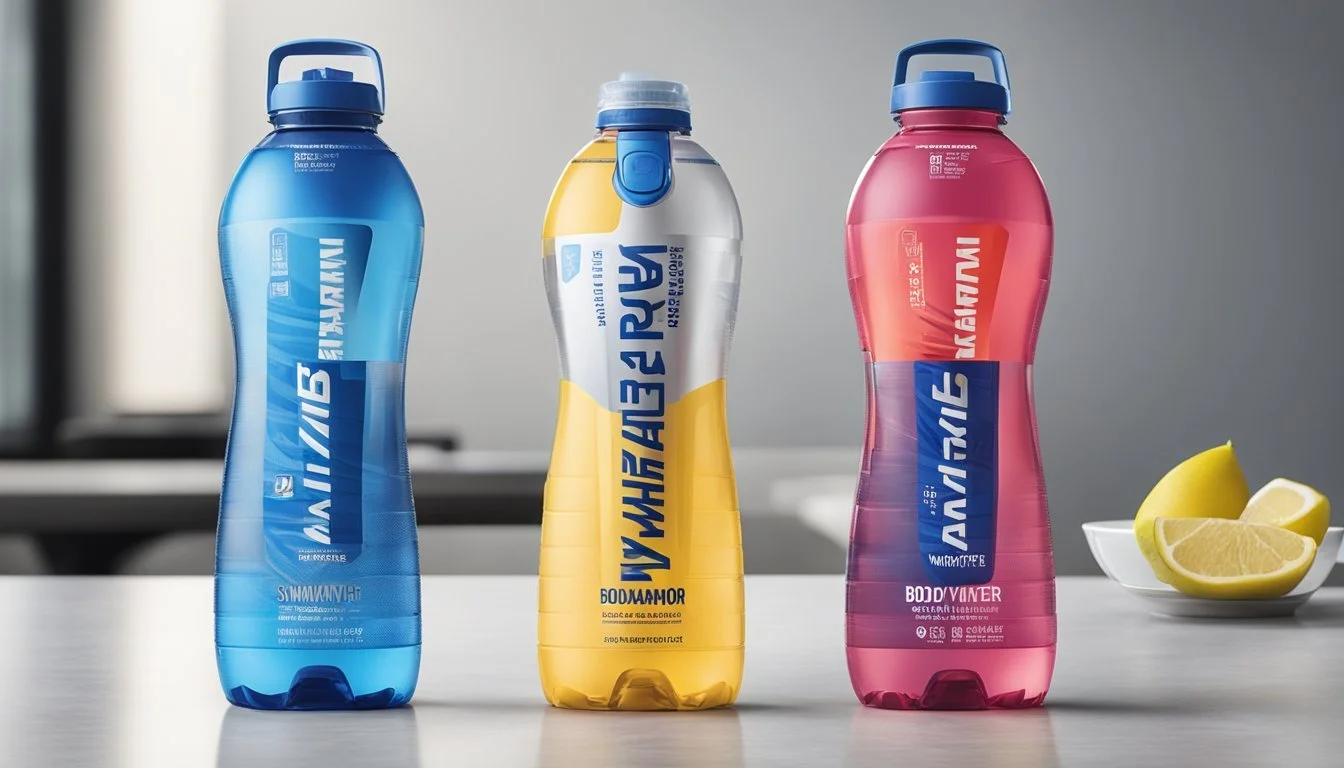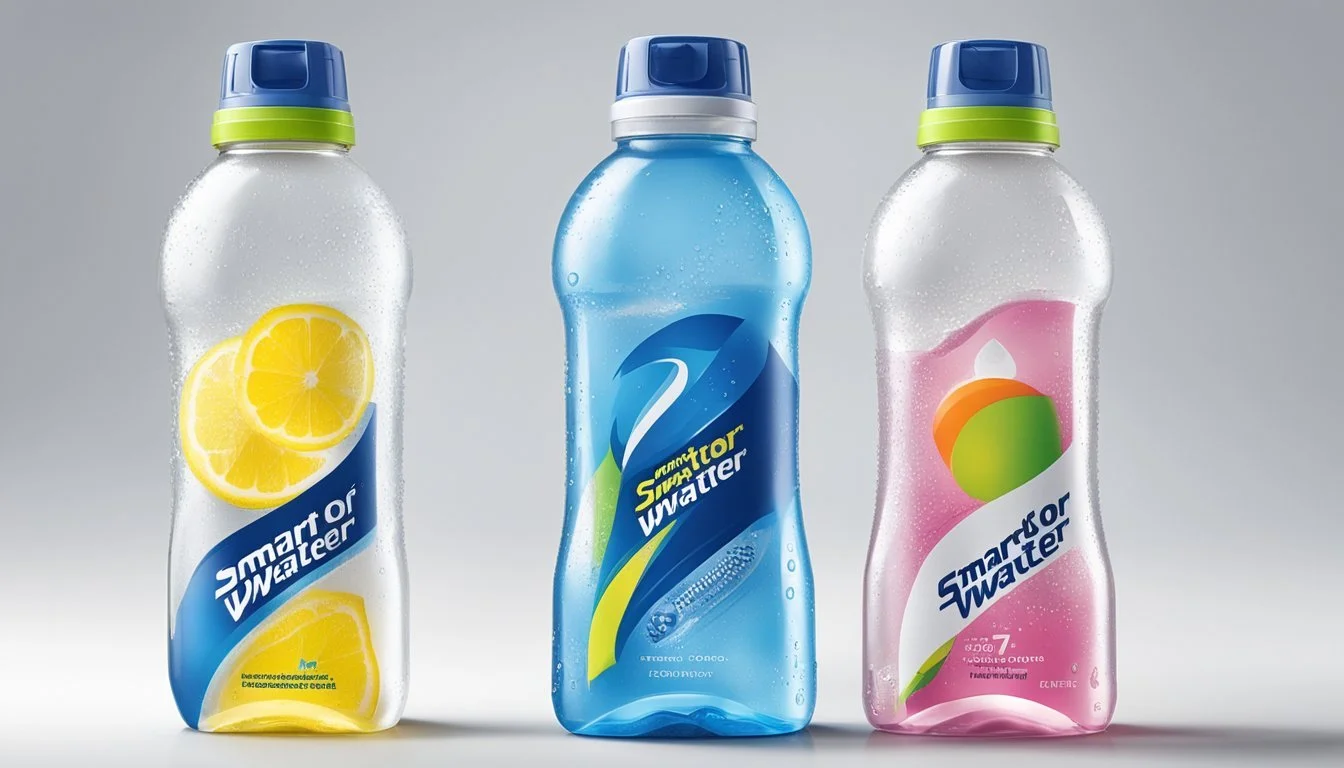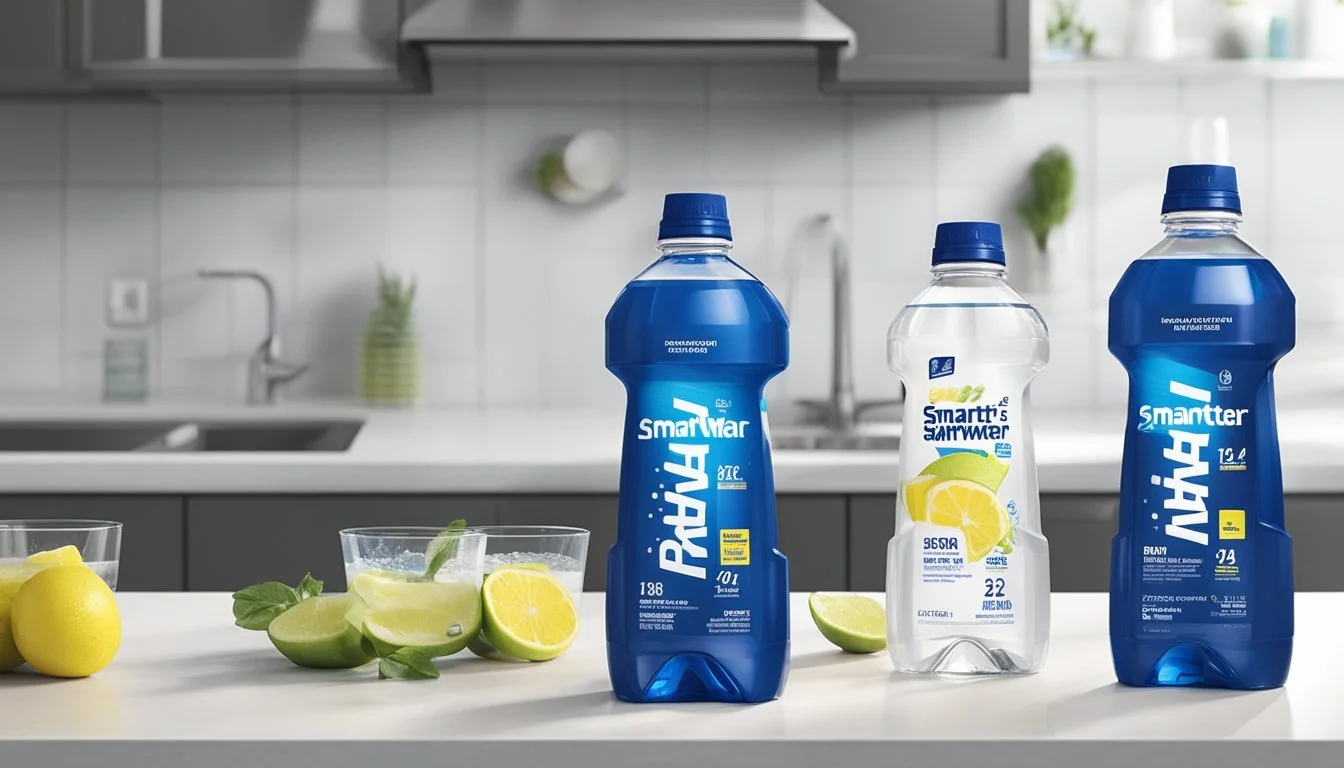Smartwater vs. BodyArmor
Comparing the Best Bottled Waters
When choosing the best bottled water, the options can be overwhelming. Two popular brands that often come up in discussions are Smartwater and BodyArmor. Each brand claims various benefits, but how do they truly compare?
Smartwater offers a pH level of 9+ and added electrolytes, which provide a smooth taste and potential health benefits. It’s vapor distilled, giving it a crisp and clean finish, making it a preferred choice for those looking for a premium hydration experience.
In contrast, BodyArmor markets itself as having a pH of 8 or higher, though some tests suggest it may fall short of this claim. Despite this, BodyArmor still boasts an impressive TDS (Total Dissolved Solids) score, indicative of the purity achieved through reverse osmosis. This makes it a solid competitor in the bottled water market.
Understanding Bottled Water
Bottled water varies significantly in its composition and quality, influenced by the minerals it contains and the processes it undergoes. Factors like electrolytes, purification methods, and pH levels play crucial roles.
Definition and Types of Bottled Water
Bottled water comes in several types, each defined by its source and treatment. Purified water is typically sourced from municipal supplies and treated to remove impurities through processes like reverse osmosis or distillation.
Mineral Water contains naturally occurring minerals and is often sourced from springs. Alkaline water is water that has a higher pH level and may be ionized or have added minerals to achieve its alkalinity. Distilled water is highly purified and free of most minerals through distillation, removing contaminants and natural minerals.
The Role of Electrolytes in Hydration
Electrolytes are minerals in water that help maintain fluid balance and support muscle function. Common electrolytes include sodium, potassium, calcium, and magnesium.
Water with added electrolytes can enhance hydration by replenishing these essential minerals, especially important during intense physical activity. For instance, Smartwater and BodyArmor both include electrolytes to improve taste and hydration.
Electrolyte-enriched water can prevent dehydration more effectively than plain water, providing essential nutrients that the body loses through sweat and other bodily functions.
Common Processes: Distillation vs. Reverse Osmosis
Distillation involves boiling water and then condensing the steam back into liquid form, removing contaminants and most minerals. This results in very pure water but lacks beneficial minerals.
Reverse osmosis pushes water through a semi-permeable membrane, filtering out impurities and larger particles. Unlike distillation, reverse osmosis can retain certain minerals or have them added back, balancing purity with nutritional content.
Both processes significantly reduce Total Dissolved Solids (TDS). While distillation achieves higher purity by removing almost all TDS, reverse osmosis offers a balance, keeping some beneficial minerals.
Water ionizers are also used to create alkaline water by using electrolysis to separate acidic and alkaline components. This can affect water's pH and mineral content, promoting potential health benefits. However, the health impacts of alkaline water are still debated.
By understanding these aspects, consumers can make informed choices about the bottled water they consume, considering factors such as mineral content, purity, and hydration effectiveness.
Comparative Analysis
When deciding whether to choose Smartwater or BodyArmor, it's essential to look at their nutritional profiles and pH levels. These factors can significantly impact hydration and overall health.
Nutritional Profile Comparison
Smartwater and BodyArmor differ notably in their nutritional content. Smartwater is known for its consistent inclusion of electrolytes—Calcium Chloride, Magnesium Chloride, and Potassium Bicarbonate. These additives enhance the water's taste and help maintain electrolyte balance.
BodyArmor, on the other hand, integrates a robust blend of electrolytes like Potassium, Calcium, Magnesium, and Sodium, but it also features coconut water, which adds natural sugars and amino acids. This combination aids athletic performance, offering a different benefit compared to Smartwater.
Here's a quick comparison:
Nutrient Smartwater BodyArmor Calcium Added (as Calcium Chloride) Natural sources Magnesium Added (as Magnesium Chloride) Natural sources Potassium Added (as Potassium Bicarbonate) Higher content from coconut Sodium None Present
This detailed nutritional contrast reveals that each brand caters to different hydration needs.
pH Level and Its Significance
Smartwater generally maintains a neutral pH, which typically ranges around 7. Its neutral pH mimics most natural water sources, making it easy on the stomach and suitable for daily consumption. The added electrolytes do not significantly alter its pH level, maintaining its refreshing quality.
BodyArmor focuses more on providing an alkaline pH, which can exceed 8. This higher pH is beneficial for those looking to balance the body's acidity. Alkaline water advocates believe that such water helps neutralize acid in the bloodstream and may improve metabolism and energy levels.
In Summary:
Smartwater: Neutral pH (~7), added electrolytes for taste and balance.
BodyArmor: Alkaline pH (>8), high electrolyte content, and includes coconut water for enhanced hydration.
These differences highlight their specific target demographics and intended uses, offering consumers a clear choice based on their hydration and health goals.
Health and Hydration
Both Smartwater and BodyArmor Sport Water offer unique benefits designed to support hydration and overall health, particularly during exercise and daily activities.
Hydration During Exercise and Daily Life
Smartwater uses a reverse osmosis process to purify its water and adds electrolytes like calcium, magnesium, and potassium for a clean taste. This makes it an appealing choice for everyday hydration.
BodyArmor Sport Water contains a blend of electrolytes, such as sodium, potassium, and magnesium, tailored for athletes and fitness enthusiasts. This combination helps with rehydration during and after intense exercise. Its natural flavors and real fruit juice content make hydration more enjoyable for many.
The Impact on Body's Hydration Status
Smartwater’s added electrolytes and purified nature support maintaining the body's hydration status throughout the day, making it suitable for those with active lifestyles or specific hydration needs.
BodyArmor’s enhanced electrolyte profile is designed to quickly replenish what’s lost during heavy exercise. The presence of electrolytes ensures that the body can effectively maintain fluid balance, supporting quicker recovery and sustained performance during prolonged physical activities.
Enhanced Water vs. Tap Water
Tap water contains essential minerals like fluoride, which can be beneficial for dental health. However, for some, concerns about contamination or taste make bottled water more appealing.
Smartwater offers the benefit of portability and purity, crucial for people with compromised immune systems or those preferring a consistent taste.
BodyArmor Sport Water goes further by providing targeted electrolyte replacement, making it exceptional for fitness training and maintaining a healthy lifestyle. For athletes, BodyArmor's formulation can give an edge in maintaining optimal hydration and performance levels that tap water might not necessarily achieve.
Product Ingredients and Quality
The ingredients and quality of Smartwater and BodyArmor bottled water are two critical aspects to examine. Both brands aim to offer high-quality hydration, but their approaches and components differ significantly.
Smartwater and BodyArmor Ingredients
Smartwater primarily focuses on vapor-distilled water with added electrolytes such as calcium, magnesium, and potassium. These additives enhance taste and hydration without introducing unhealthy elements.
BodyArmor SportWater, on the other hand, incorporates a blend of electrolytes like sodium, potassium, and magnesium. It also includes natural flavors and colors, often derived from real fruit juice, to appeal to consumers seeking more than just hydration.
Brand Key Ingredients Additives Smartwater Vapor-distilled water, electrolytes Calcium, magnesium, potassium BodyArmor Reverse osmosis water, electrolytes Sodium, potassium, magnesium, natural flavors/colors (real fruit juice)
Quality Standards and Regulatory Compliance
Smartwater adheres to strict FDA guidelines for bottled water, ensuring product safety and quality. It undergoes vapor distillation, a process that eliminates impurities and contaminants. This results in water that meets high regulatory standards and is free from potentially harmful substances.
BodyArmor also follows stringent FDA regulations, particularly for its electrolyte-infused water. The reverse osmosis filtration process employed by BodyArmor effectively removes contaminants, providing clean and safe hydration.
Both brands prioritize consumer safety, adhering to water quality standards that ensure their products are free of contaminants and impurities. They meet the regulatory requirements set forth by governing bodies, thus guaranteeing their waters are both safe and quality-assured.
Environmental and Health Considerations
When comparing Smartwater and BodyArmor, it's crucial to consider the environmental impact of their packaging and any potential health effects from the materials used. Both brands utilize plastic bottles, but there are key differences in their approaches to sustainability and health safety.
Packaging Materials and Environmental Impact
Smartwater bottles are made from PET plastic (Polyethylene Terephthalate), a widely recycled material. Smartwater emphasizes its commitment to sustainability by using 50% recycled plastic content in its bottles. Their aim is to eventually use 100% recycled materials.
BodyArmor, on the other hand, also uses PET plastic for its bottles. They focus on being BPA-free, ensuring no harmful chemicals are present in the plastic. Both brands' bottles are fully recyclable, promoting environmental responsibility. However, the actual environmental impact depends heavily on consumers' recycling practices.
Potential Health Effects of Packaging
Smartwater employs PET plastic, which is generally considered safe and widely used in the food and beverage industry. The potential health concern with PET plastic is the use of BPA (Bisphenol A), a chemical linked to various health issues. However, Smartwater bottles are labeled BPA-free, reducing these risks.
BodyArmor also ensures its bottles are BPA-free, preventing the potential for BPA leaching into the water. Being BPA-free is a significant health consideration for consumers concerned about chemical exposure.
In both cases, the focus on using BPA-free PET plastic helps to alleviate most health concerns related to packaging, ensuring the water remains safe for consumption during its shelf life.
Feel confident in the safety and environmental responsibility of both brands, yet mindful that recycling these products is key to minimizing their environmental footprint.
Brand Profiles and History
Smartwater and BodyArmor have distinct origins and evolutions, each positioning itself uniquely within the bottled water market. This section examines their backgrounds and market strategies.
Smartwater: Brand, Market Position and Variants
Smartwater, a product under the Coca-Cola Company, was introduced in 1996. Known for its vapor-distilled water and added electrolytes, it quickly became a popular choice for consumers seeking premium hydration solutions.
The brand leverages its unique distillation process, marketing its water as exceptionally pure. Additionally, it offers different variants, including Smartwater Alkaline with a higher pH level and Smartwater Antioxidant infused with selenium.
Smartwater aims to provide a balance of purity and enhanced hydration.
BodyArmor: Brand Evolution and Market Presence
BodyArmor, launched in 2011, is marketed as a premium sports drink offering superior hydration. Initially, BodyArmor positioned itself as a healthier alternative to traditional sports drinks like Gatorade.
The brand emphasizes natural flavors and a blend of electrolytes, including sodium, potassium, and magnesium. Notably, BodyArmor expanded its product line to include BodyArmor SportWater, a variant specifically designed for active consumers.
Coca-Cola acquired a significant stake in BodyArmor in 2018, boosting its market presence. With backing from prominent athlete investors, BodyArmor continues to grow as a strong competitor in the hydration market.
Practical Considerations for Consumers
When choosing between Smartwater and BodyArmor, consumers should evaluate both cost and convenience. Each bottled water brand offers unique benefits that cater to different needs.
Cost Comparison and Value
Cost is a major factor for many consumers. Smartwater generally falls into the premium bottled water category, often priced higher than standard brands like Aquafina, Dasani, and Nestle Pure Life. Prices are typically around $1.50 to $2.00 per bottle, depending on size and retailer.
BodyArmor, while also premium, tends to vary more significantly based on its added functional benefits. For instance, BodyArmor's sports line, rich in electrolytes and vitamins, might cost between $1.75 to $2.50 per bottle. Consumers seeking more value may consider bulk purchasing options for both brands.
Convenience and Accessibility
In terms of accessibility, Smartwater is widely available in most grocery stores, convenience stores, and online retailers. Its recognizable branding ensures it is stocked in many locations, including vending machines and fitness centers.
BodyArmor also boasts high availability, particularly in stores that focus on health and fitness products. Given its association with sports, it’s often found in gyms and sporting goods stores as well. For consumers who prioritize hydration and enhanced functionality, both options provide ample accessibility.
In the end, both Smartwater and BodyArmor offer distinct advantages depending on what consumers prioritize in their daily hydration needs.
Conclusion
Hydration:
Smartwater and BodyArmor both offer hydration solutions. Smartwater provides a crisp, clean taste with added electrolytes. BodyArmor, with its variety of flavors, also offers a hydrating option but includes more ingredients like cane sugar.
Ingredients:
Smartwater contains vapor-distilled water and added electrolytes. In contrast, BodyArmor includes coconut water, vitamins, and higher levels of cane sugar.
Environmental Impact:
Smartwater typically comes in plastic bottles. BodyArmor often uses plastic bottles as well, although there are various packaging sizes available. Both brands face similar environmental concerns related to plastic waste.
Suitability:
Smartwater is suitable for everyday hydration and is convenient for its minimalistic composition. BodyArmor, with its enhanced formula, suits active individuals needing a quick hydration boost, especially during sports.
Nutritional Value:
Smartwater offers trace minerals through added electrolytes. BodyArmor provides additional nutrients like vitamins and coconut water, albeit with higher sugar content.
By comparing these bottled waters under different aspects, consumers can make an informed choice based on their specific hydration needs and preferences.
More About Smartwater
Core Hydration vs Smartwater: Which Bottled Water is Better?
Icelandic Glacial vs Smartwater: Which Bottled Water is Better?
Mountain Valley Spring Water vs Smartwater: Which Bottled Water is Better?
Nestle Pure Life vs Smartwater: Which Bottled Water is Better?
San Pellegrino vs Smartwater: Which Bottled Water is Better?
Smartwater vs Aqua Carpatica: Which Bottled Water is Better?
Smartwater vs Cascade Mountain: Which Bottled Water is Better?
Smartwater vs Crystal Geyser: Which Bottled Water is Better?
Smartwater vs Hawaii Volcanic: Which Bottled Water is Better?
Smartwater vs Hawaiian Springs: Which Bottled Water is Better?
Smartwater vs Kirkland Signature: Which Bottled Water is Better?
Smartwater vs Richard's Rainwater: Which Bottled Water is Better?
Smartwater vs Solan de Cabras: Which Bottled Water is Better?
Smartwater vs Talking Rain AQA: Which Bottled Water is Better?
Smartwater vs Whole Foods 365: Which Bottled Water is Better?
Smartwater vs Whole Foods Italian Still Mineral water: Which Bottled Water is Better?
More About BodyArmor
BodyArmor vs Kirkland Signature: Which Bottled Water is Better?
Cascade Mountain vs BodyArmor: Which Bottled Water is Better?
Hawaii Volcanic vs BodyArmor: Which Bottled Water is Better?
Hawaiian Springs vs BodyArmor: Which Bottled Water is Better?
Icelandic Glacial vs BodyArmor: Which Bottled Water is Better?
Mountain Valley Spring Water vs BodyArmor: Which Bottled Water is Better?
Nestle Pure Life vs BodyArmor: Which Bottled Water is Better?
Richard's Rainwater vs BodyArmor: Which Bottled Water is Better?
Solan de Cabras vs BodyArmor: Which Bottled Water is Better?
Talking Rain AQA vs BodyArmor: Which Bottled Water is Better?
Whole Foods 365 vs BodyArmor: Which Bottled Water is Better?
Whole Foods Italian Still Mineral water vs BodyArmor: Which Bottled Water is Better?






